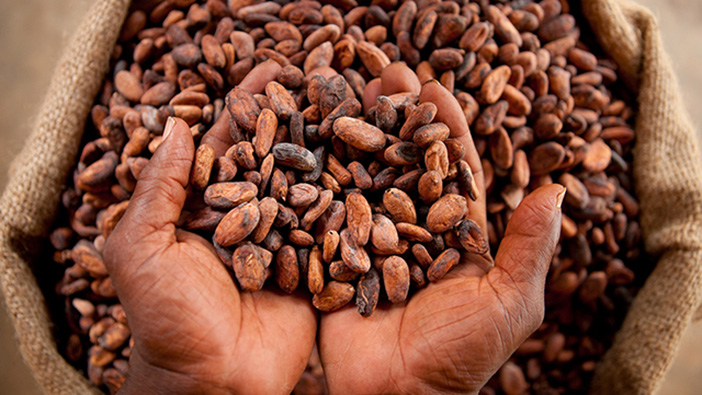Ghana, Côte d’Ivoire and Nigeria have allied in an effort to boost cocoa farmers’ incomes, denouncing foul play in the cocoa trading market. The move comes as the world’s largest cocoa-growing countries ramp up efforts for fair treatment and pay and eliminate adverse industry practices for good.
The cocoa regulatory authorities in western Africa claim that since the COVID-19 pandemic began, some companies have been bypassing payments of a living income differential (LID) of US$400 per metric ton of cocoa beans.
The LID initially came into effect in 2020 to level the playing field and ensure fair payment to cocoa farmers.
However, Joseph Boahen Aidoo, chief executive of Ghana Cocoa Board (COCOBOD), has announced the creation of a list of companies that are not paying the LID and the country premiums. However, so far, the list has not been published.
“In the immediate term, we are going to begin the publication of all the buyers of cocoa from Ghana and Côte d’Ivoire who pay as well as those who do not pay the country origin differentials,” he says.
Big discounts, higher prices?
According to Aidoo, some buyers are discounting the country origin differentials by as much as US$270 to US$300 per ton of cocoa.
The Côte d’Ivoire and Ghana partnership has gathered interest among other cocoa nations like Nigeria and Cameroon (Credit: Koa).
This creates a market distortion where cocoa prices are moderately low – cocoa futures are trading at six months low on Wall Street– but prices on shelves keep rising.
Cocoa futures are standardized, exchange-traded contracts where the contract buyer agrees to take delivery, from the seller, of a specific quantity of cocoa at a predetermined price.
“Meanwhile, the price of chocolate in the consumer market is going up at a time when cocoa prices are falling,” says Aidoo.
Furthermore, bad harvests are not pushing up cocoa prices so far.
“Several factors, including adverse weather conditions and diseases are negatively affecting production for the ongoing season, with concerns for the size and quality of the ongoing mid-crop in West Africa,” says an International Cocoa Organization (ICCO) statement.
“Following the Russia-Ukraine conflict, trade disruptions, sanctions and high freight rates are affecting cocoa and fertilizer trade. The shortage of fertilizers on cocoa farms will very likely affect the quantity, quality and size of cocoa beans.”
Moreover, according to ICO, the demand for chocolate is picking up, with “positive quarterly earnings reports from major confectionery manufacturers” this 2022.
“Factors which contributed to the increase in cocoa demand include the resumption of activities in the air travel sector…as well as the recommencement of seasonal festivities,” explains ICCO.
Nigeria joins the duoSome buyers are discounting the country origin differentials by as much as US$270 to US$300 per ton of cocoa.
The Côte d’Ivoire and Ghana partnership has gathered interest among other cocoa nations like Nigeria and Cameroon.
“Cocoa is the highest non-oil contributor to Nigeria’s GDP and the country is ranked number four among cocoa producing countries in the world,” says Dr. Ernest Umakhihe, the Permanent Secretary of the Federal Ministry of Agriculture and Rural Development of Nigeria.
According to him, the Cocoa Farmers Association of Nigeria (CFAN), an organized umbrella body of smallholder farmers across the cocoa-producing states in Nigeria, seeks to improve the livelihoods of its farmers by integrating the LID system of US$400 per cocoa ton.
Cameroon has also shown interest in joining the initiative.
“The two countries coming to join Ghana and Côte d’Ivoire will create an alliance of countries, whose total production constitutes 75% of the world’s cocoa supply,” highlights Aidoo.
Companies boost their own farmer income programs
Confectionery giants have been playing their part to create a sustainable cocoa sector with fair prices for all and the elimination of unethical practices.
Chocolate behemoth Mars started two “farmer-first” programs that will support the sustainable living income of 14,000 smallholder farmers in Côte d’Ivoire and Indonesia. Helping farmers access, for example, the financial systems for the first time.
On child labor risks, Nestlé is offering financial incentives to farmers to reduce harmful practices and help local woman. The company is also focusing on working toward regenerative agriculture practices.
Working to make the cocoa business transparent, Koa, is working on a blockchain-based technology that allows customers to monitor the extra income paid to farmers in real-time, with transactions being public, transparent and verifiable. Koa expects to reach over 12,000 farmers in the next two years and has currently over 2,200 in its value chain.
By Marc Cervera

